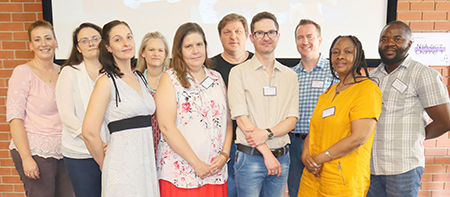The only thing that is constant is change. To keep up with change, the NWU often updates the content of its academic programmes.
As a strategic initiative to ensure relevant and up-to-date study modules and programmes for students, the North-West University’s (NWU’s) Centre for Teaching and Learning (CTL) has launched various workshops for academic staff.
Staff of the Faculty of Engineering recently participated in such a two-day workshop.
The workshop facilitator, Dr André Bechuke, says they want to inspire academic staff to enhance their teaching and learning so that they can support students to be successful.
“The workshop we present is called Carpe Diem, and it provides lecturers with the opportunity to redesign or review their programmes or modules, while they are guided through structured activities and working collaboratively within multidisciplinary teams,” says Dr Bechuke.
“This process focuses on effective learning design where learning outcomes are scaffolded and aligned to content, activities, assessment and feedback, along with the embedding of innovative teaching practices and digital technologies.”
Prof Robert Balfour, deputy vice-chancellor for teaching and learning, explains the importance of developing academic staff.
“The quality of education – whether in continuing education, post- or undergraduate programmes – depends on the knowledge and skills academics develop to ensure that teaching and learning are collaborative and lead to critical, innovative and stimulating thinking. Student and staff development is complementary in terms of our commitment to a quality education experience,” says Prof Balfour.
Dr Bechuke says the first step in the Carpe Diem process is to identify the essential aspects of the module or programme that will be reviewed or redesigned. This is followed by the compilation of a storyboard prototype which entails unpacking the learning, teaching and assessment of the module. The aim is to demonstrate how the module components align and form a logical flow.
Academic staff then has to build a prototype of the revised modules or programmes. This includes developing activities and testing them in a practical manner. This step also serves as a screening opportunity to establish whether the face-to face and online components of the course will complement each other.
According to Dr Bechuke, teams then get the opportunity to test each other’s module designs and activities. “An evaluation form that addresses aspects such as inclusivity, active engagement, authenticity and alignment provides valuable feedback. During the steps of reviewing and adjusting, teams use the feedback gained in the previous steps and work together to refine their design,” he adds.
“Prototypes are improved by making alterations where needed. Resources that will be needed are listed, deadlines are set and ultimately, the responsible persons are nominated to roll-out and complete the design.”
This is just another NWU initiative to ensure that students get a well-rounded, quality education that will empower them to enter the professional labour market.

Colleagues at the workshop are from left are Santie Pieterse, Maria van Zyl, Lisa van der Westhuizen, Vanessa Olivier, Liana Venter, Kobus le Roux, Ruveix van Coller, Prof Kenny Uren, Tabitta Lalendle, and Dr André Bechuke.
